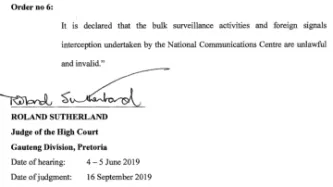Despite Claims of 'Going Dark', Five Eyes More Powerful than Ever

The recent revelations, made possible by NSA-whistleblower Edward Snowden, of the reach and scope of global surveillance practices have prompted a fundamental re- examination of the role of intelligence services in conducting coordinated cross-border surveillance.
The Five Eyes alliance of States – comprised of the United States National Security Agency (NSA), the United Kingdom’s Government Communications Headquarters (GCHQ), Canada’s Communications Security Establishment Canada (CSEC), the Australian Signals Directorate (ASD), and New Zealand’s Government Communications Security Bureau (GCSB) – is the continuation of an intelligence partnership formed in the aftermath of the Second World War. Today, the Five Eyes has infiltrated every aspect of modern global communications systems.
The world has changed dramatically since the 1940s; then, private documents were stored in filing cabinets under lock and key, and months could pass without one having the need or luxury of making an international phone call. Now, private documents are stored in unknown data centers around the world, international communications are conducted daily, and our lives are lived – ideas exchanged, financial transactions conducted, intimate moments shared – online.
'Most powerful they've ever been'
The drastic changes to how we use technology to communicate have not gone unnoticed by the Five Eyes alliance. A leaked NSA strategy document, shared amongst Five Eyes partners, exposes the clear interest that intelligence agencies have in collecting and analyzing signals intelligence (SIGINT) in the digital age:
Digital information created since 2006 grew tenfold, reaching 1.8 exabytes in 2011, a trend projected to continue; ubiquitous computing is fundamentally changing how people interact as individuals become untethered from information sources and their communications tools; and the traces individuals leave when they interact with the global network will define the capacity to locate, characterize and understand entities.
Contrary to the complaints of the NSA and other Five Eyes agencies that they are ‘going dark’ and losing the visibility they once had, the Five Eyes intelligence agencies are in fact the most powerful they’ve ever been. Operating in the shadows and misleading the public, the agencies boast in secret how they “have adapted in innovative and creative ways that have led some to describe the current day as ‘the golden age of SIGINT’.”
The agencies are playing a dirty game; not content with following the already permissive legal processes under which they operate, they’ve found ways to infiltrate all aspects of modern communications networks. Forcing companies to handover their customers’ data under secret orders, and secretly tapping fibre optic cables between the same companies’ data centers anyway. Accessing sensitive financial data through SWIFT, the world’s financial messaging system, spending years negotiating an international agreement to regulate access to the data through a democratic and accountable process, and then hacking the networks to get direct access. Threatening politicians with trumped up threats of impending cyber-war while operating intrusion operations that weaken the security of networks globally; sabotaging encryption standards and standards bodies thereby undermining the ability of internet users to secure information.
Each of these actions have been justified in secret, on the basis of secret interpretations of law and classified agreements. By remaining in the shadows, our intelligence agencies – and the governments who control them – have removed our ability to challenge their actions and their impact upon our human rights. We cannot hold our governments accountable when their actions are obfuscated through secret deals and covert legal frameworks. Secret law has never been law, and we cannot allow our intelligence agencies to justify their activities on the basis of it.
In direct violation of their obligations
We must move towards an understanding of global surveillance practices as fundamentally opposed to the rule of law and to the well-established international human right to privacy. In doing so, we must break down legal frameworks that obscure the activities of the intelligence agencies or that preference the citizens or residents of Five Eyes countries over the global internet population. These governments have carefully constructed legal frameworks that provide differing levels of protections for internal versus external communications, or those relating to nationals versus non-nationals, attempt to circumvent national constitutional or human rights protections governing interferences with the right to privacy of communications.
This notion must be rejected. The Five Eyes agencies are seeking not only defeat the spirit and purpose of international human rights instruments; they are in direct violation of their obligations under such instruments. Human rights obligations apply to all individuals subject to a State’s jurisdiction. The obligation to respect privacy extends to the privacy of all communications, so that the physical location of the individual may be in a different jurisdiction to that where the interference with the right occurs.
While the existence of the Five Eyes has been kept secret from the public and parliaments, dogged investigative reporting from Duncan Campbell, Nicky Hager, and James Bamford has gone some way to uncovering the extent of the arrangement. Now, thanks to Edward Snowden, the public are able to understand more about the spying that is being done in their name than ever before.
Trust must be restored, and our intelligence agencies must be brought under the rule of law. Transparency around and accountability for these secret agreements is a crucial first step.



